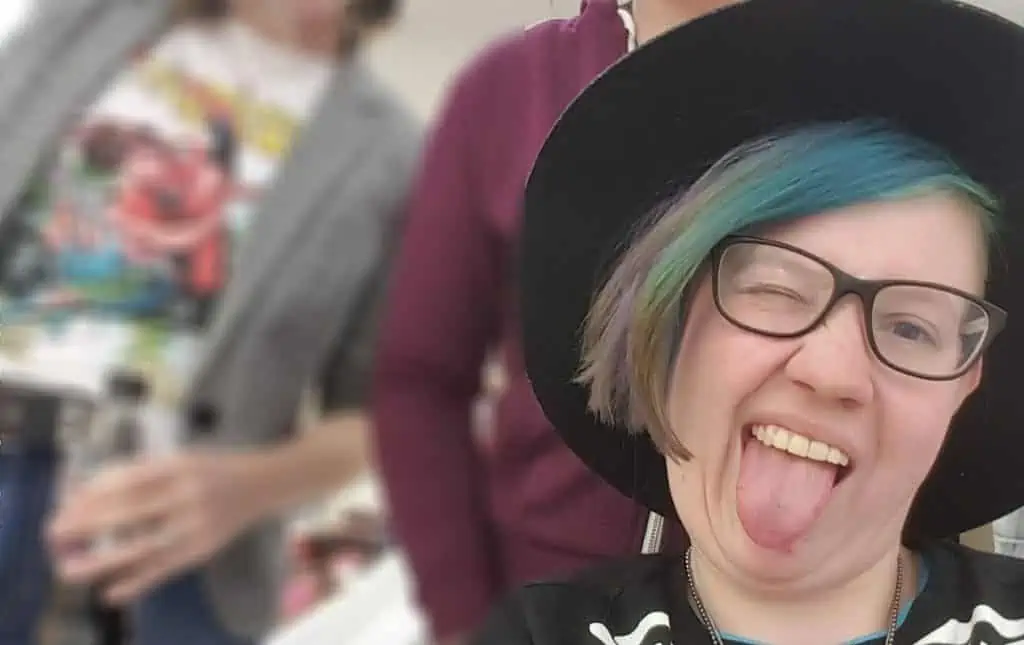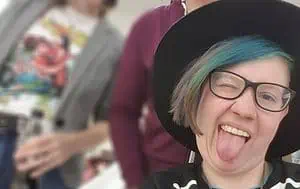
12 People On What It Felt Like To Discover Autism
After decades of oversight, autistic women, non-binary and transgender people are coming out of the shadows. For years researchers focused their studies on white middle-class boys and blinded the world to the unique ways autism expresses in different groups of people.
But that’s rapidly changing as researchers, therapists, and journalists learn how autism interacts with gender and cultural norms. From a very young age, those socialized as girls are expected to more vocal, caring, and organized than their male counterparts. Many autistic girls find ways to camouflage their differences to cope and adapt to the added social pressure, some effectively masking their autism for years.

“In so many ways my gender and autism work in tandem. Even after I came out as trans something was missing. Finding out I was autistic made everything clearer,” Credence (pronouns he/him). Photo image is of Credence, printed with permission.
Consequently, autistics may walk around with an intense fear of saying the wrong thing or acting inappropriately. This hypervigilance can lead to depression and anxiety. But without an understanding of neurodiversity, mental health tends not to improve with traditional therapies. More often than not, professionals seeking to provide support and relief are just as lost on why their patients’ struggles never seem to lighten.
But support groups on social media and a hike in journalism on this topic have opened up waves of understanding of the complex ways autism conveys. Autistic women and transgender people are coming into the limelight. Some laden with regret and anger that they didn’t receive support earlier in life while others are just relieved to finally discover a piece of themselves they always felt was missing.
I talked with 12 people about what it felt like to discover autism after years in the dark. One woman wrote that it was like “coming home” while another said it took years to accept that she wasn’t a “badly-made neurotypical” but more like a “half-open bud with a beautiful neurodiverse future.”
Here are the stories of self-discovery and their own words.
Annie, 39, discovered autism at 35
For the longest time, I let my challenges define my self-worth. Up until a few years ago, I was struggling with social interactions for no particular reason. I found myself overstimulated by my environment and crumbling under stress. The best I could do was “blend in” but “trying harder”only exacerbated my loneliness. A sequence of psychologists and doctors could never pinpoint anything more than depression, anxiety or ADHD.
But autism? All I knew of it back then was a “mysterious condition causing severe social impairment.” I stumbled accidentally into online Autism support groups 5 years ago and discovered the complexity and richness of women on the spectrum and found that I related to them so much. From then it took 3 years to (finally!) persuade my doctor to pursue an official diagnosis.
My autism diagnosis has been a relief in the way I relate to others and myself: more gently, attuned to my body and emotions. With my 40th birthday around the corner, I am still paddling with difficulty in the neurotypical world, but I have found my tribe. Autism is one of the unique qualities I carry with pride.
Courtney Johnson, 21, discovered autism at 19
I was relieved. Everything made so much more sense. But I was also a little bitter because I wished someone had known sooner and I had gotten the support and understanding that I needed growing up.
Bet-Zua Jimenez, 22, discovered autism at 22
When I first discovered I was autistic it was like a light bulb went off and suddenly I could see the shape of my life. I began to look around with this new lens and things began to make sense. I could see why people attached words like “cold”, “standoffish”, “mysterious”, “shy”, and “quiet” to me even when I was always trying to keep a fire in.
I learned that my passions, my incredible capacity for joy is a “special interest”. I learned that there were other people in the world who, moved by a poem, might feel the need to jump and spin joyfully. I learned that other people did not live their lives in the discomfort which forced me to dissociate daily. I learned that a life is supposed to be comfortable, that I don’t have to be bombarded by sound and light because my senses are more sensitive than the average persons. I learned that I deserve to behave in a way that is natural and comfortable for me, whether or not that upsets others’ ideas of normalcy.
Credence, 24, discovered autism at 18
It made sense of a childhood fraught with confusion. Social norms didn’t make sense to me, especially compulsory cishet. In so many ways my gender and autism work in tandem. Even after I came out as trans something was missing. Finding out I was autistic made everything clearer.
Sara Mills, discovered autism well into her 20’s
I finally had an answer: I wasn’t WRONG for being the way I was not a broken version of a “normal” person. I was just different.
After discovering, I was able to forgive and go easier on myself. I understand now when not to push myself too hard. It was like putting the key in a lock and opening a door to a world where I made sense.
Kat, 34, discovered at 34
My first response was: relief. For years, I’d been going to therapy wondering why it was difficult to create and maintain healthy relationships, completely oblivious to the source of my social struggles. Learning that it’s innate immediately removed decades of self-blame which had manifested as depression from being perpetually lonely and anxiety from struggling with social interactions.
I mask well, including in therapy, so it remained a puzzle for many years. But so much of that time was spent an in intense self-examination in doing various therapies: talk therapy, EMDR, somatic patterning, 12-steps, moral inventories, meditation course, an unbelievable amount of navel-gazing.
So the lion’s share of the work was done by the time I learned about autism. Honestly, I believe that was beneficial to me. If I’d been told as a sullen lonely teenager that I was autistic I would have drowned in an even deeper depression, believing that making friends and relationships and having a job and gaining independence would be impossible. Learning about this myself at 34 was the ideal time to find out. I’ve no regrets about not having learned it sooner.
Rae, 28, discovered autism at 17
When I was first realized I had autism I was glad. I discovered what was wrong with me but I was frustrated that medicating it away like any other ailment wasn’t working. I had spent 17 years mentally and emotionally invested in being as “normal” as possible in order to be loved. It took years to unlearn that.
I spent the next 10 years trying to be normal. Only then did I recognize that being autistic isn’t a disease – it’s a beautifully made puzzle-box. I still struggle with finding a place in the world that suits me, but now I feel less like I’m a badly-made neurotypical and more like a half-open bud with a beautiful neurodiverse future.
Oishiin, 42, discovered autism at 34
I initially thought the diagnosis was correct but then I rejected it because the negative imposition projected by the neurotypical mental health professionals. I knew deep down that this is something positive they cannot grasp. It was like letting aliens label me.
Heather Flanagan, 48, discovered autism at 37
It felt like coming home. I was able to share my experience with my family and not feel pressure to think quickly in order to preserve this false illusion of myself. I was free but also unsettled as I was out of my cage and am not sure how to act. Slowly, I allowed myself to act proudly in weird ways that feel more authentic.
Wendy Graves, 29, discovered autism at 25
They told me I was bad. They told my parents I was lazy and faking it. I felt alone on this earth. I was like no one else that I knew. I was a mask and my inner light was fading. I wasn’t connected to my true self in any way.
Nella, 25, discovered autism at 25
Relief. Just pure relief that there were other people like me. That I wasn’t weird or crazy or an alien. Just autistic!
Rosemary, 31, discovered autism at 28
I felt like The Little Mermaid (the Hans Christian Andersen version) my entire life. I was walking around enduring a lot of agony for the sake of appearing neurotypical. I was regarded by the people around me as an oddity, almost like them, but not quite. Just a quirky novelty, not someone to be respected or loved.
Coming to terms with being autistic was heartbreaking because I realized I might never achieve the normalcy or skill level that my peers took for granted. I would never be “part of their world.” Eventually, this feeling turned into liberation after I stopped feeling like I had to please the world by being someone I’m not. I found some semblance of peace.
About the writer, Reese Piper
